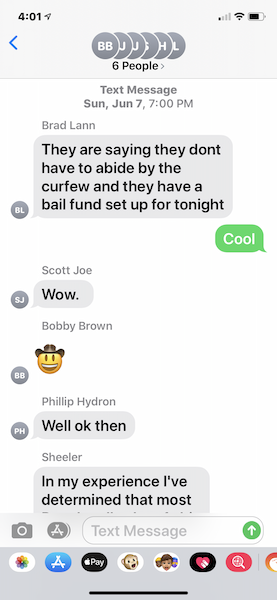As time allows, I continue to go through a large pile of information I received from the Arkansas State Police via the Arkansas Freedom of Information Act back in May and June regarding the protests in Little Rock in the wake of George Floyd’s murder. One thing that has really jumped out as I have looked at all of this stuff is the obvious disdain and us-against-them mentality with which the law enforcement agencies involved approached their response to protests.
For example, take the following text conversation:

That is members of a law-enforcement agency discussing FBI intelligence about a “group of white guys from Texas and Oklahoma here with guns and body armor,” and the first reaction from them is to ask if the non-law-enforcement people driving in from out of state with guns and body armor are on “our side or against us.” That police would see responding to protests (BLM-related or otherwise) as their side versus some other side, rather than as being there to neutrally and fairly uphold the law, is alarming at best.
It is even more jarring, however, when you consider that they are talking about a group of armed and armored people coming from out of state apparently in response to the protests. The right reaction would have been acknowledgment that the armed people arriving from out of state could be coming to engage in violence against the protestors; instead, this conversation shows the police tacitly deciding that the “white guys…with guns and body armor” were on the side of law enforcement and were apparently no big deal.
It should go without saying , but seeing a protest that is in response to the murder of a black man by Minneapolis police and immediately deciding that those protestors are “against” you, rather than attempting to understand the root causes of the protest and do something about them, is not a productive response. Combine that reaction with a mindset that it is fine if a bunch of people show up from out of state with guns and body armor in response to Arkansans’ protesting, as long as those out-of-state folks are on “our side,” and you have a perfect example of the kind of relationships between police and people of color that led the protests in the first place. 1 After all, the protests in late May and early June were in response to police violence against non-white members of our society, and many of the speakers each day stressed that they were not anti-police; they were anti-bad police. Which, honestly is a position that we should all be able to get behind.
With that context in mind, contrast the “our side or against us” mentality of the police officers in the conversation above with the sentiment displayed here:
That is LRPD Asst. Chief Alice Fulk texting an ASP officer with information about “Boogaloo’s [sic]…having an event” and stressing that “they are an anti government group NOT white supremacist.” There is a lot to unpack in such a short text.
First, stressing that a group is “NOT white supremacist” feels a lot like a cop version of the old Mike Ginn tweet, “My ‘Not involved in human trafficking’ T-shirt has people asking a lot of questions already answered by my shirt.” Like, why would you even stress that? (According to multiple people who have researched the topic, there are, in fact, some white supremacist groups within the Boogaloo movement.)
Secondly, and more glaring, Asst. Chief Fulk’s description of the group as “anti government” is a really odd way to describe a group with a lengthy, documented record of talking about–and, in some cases attempting to act out–violence against police. Or, as Mark Pitcavage of the Jewish Anti-Defamation League told New York Times Magazine, “They’re really anti-police; they may say they want to find common cause with anyone protesting the police — but some want to act as agents provocateurs, accelerating street violence and furthering any conflict.” Indeed, less than two months prior to Fulk’s text message, a “Boogaloo Boy” in Texarkana, Texas, was arrested for plotting to murder police officers.
I wish I could say that law enforcement acting like BLM-related protestors are “against” police, while preemptively defending an event by a group that has repeatedly professed a desire to actually kill police, is one of the damnedest things I have seen in a minute. But we live in a world where Kenosha police in armored vehicles thanked armed groups of non-law-enforcement citizens2 and said they “appreciated” the groups’ being there moments before Kyle Rittenhouse shot three protestors.
So, while everything in this post may be appalling, it is far, far from surprising.
“But wait,” you might say if you are the kind of person who looks for any excuse to side with law enforcement and against protestors, “they say right there that the protestors thought they did not have to abide by the curfew!” To which I, a non-bootlicker, would respond “so what?” Whether protestors were going to follow a city-wide curfew that was hours in the future has nothing to do with whether police should view those protestors as being on the other side (or “against us”), and seeing protesting Arkansans as “against us” and the people coming from out of state with guns as on “our side” is in no way justifiable, regardless of a city curfew.↩
I refuse to call these assholes “militias,” as it gives them a legitimacy that they do not deserve.↩